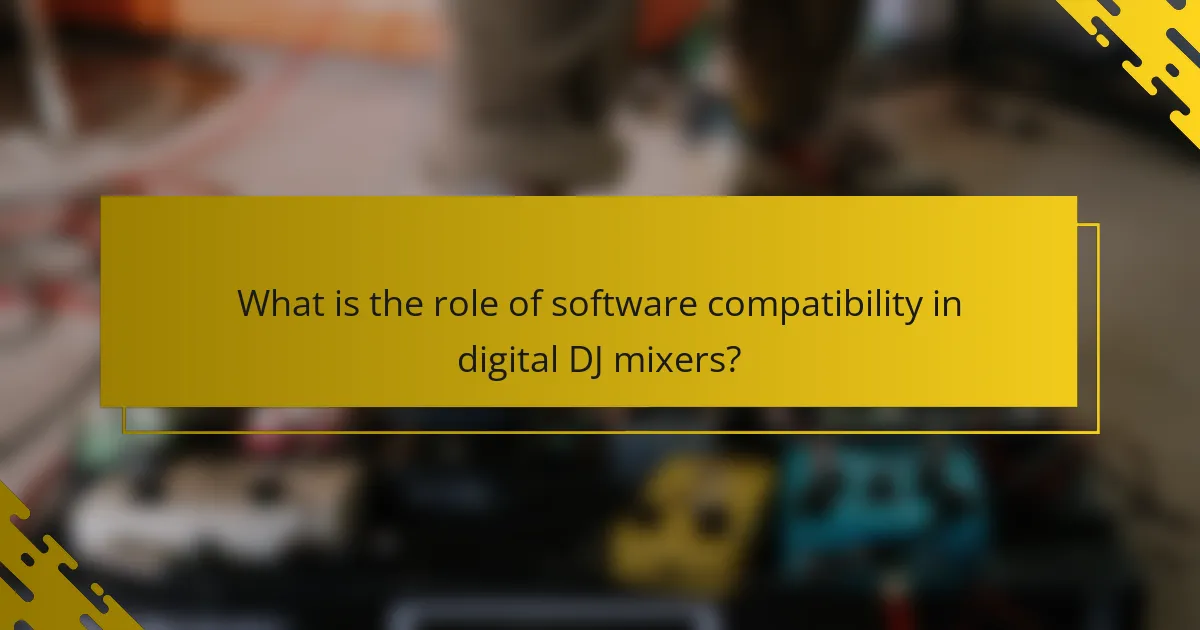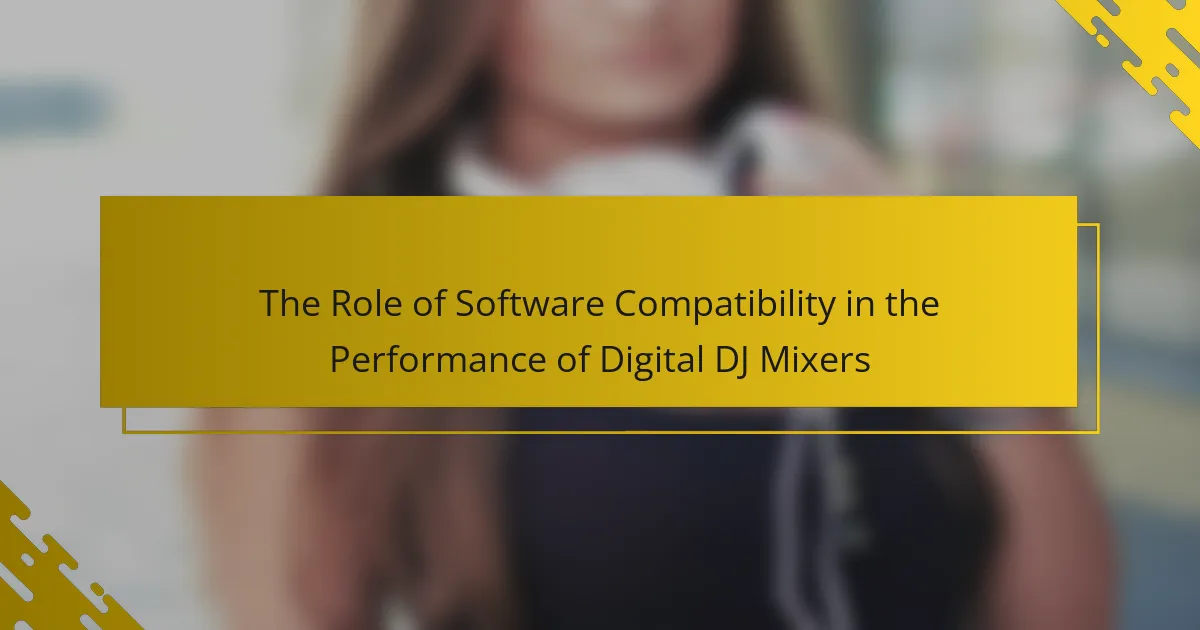Software compatibility plays a critical role in the performance of digital DJ mixers, allowing for seamless integration with various music production and performance software. This compatibility enables DJs to leverage advanced features, effects, and real-time control of audio parameters, enhancing both creativity and user experience. Mixers that support widely-used software such as Serato or Traktor significantly improve workflow efficiency, as highlighted by a study from DJ TechTools. Furthermore, software updates often introduce new functionalities that rely on this compatibility, underscoring its importance in maximizing the versatility and performance of digital DJ mixers.

What is the role of software compatibility in digital DJ mixers?
Software compatibility in digital DJ mixers ensures seamless integration with various music production and performance software. It allows DJs to utilize advanced features and effects provided by the software. Compatibility affects the ability to access different audio formats and control parameters in real-time. For instance, mixers that support popular software like Serato or Traktor enhance user experience and creativity. A study by DJ TechTools highlights that compatible software can significantly improve workflow efficiency. Additionally, software updates often introduce new functionalities that depend on compatibility with the mixer. Thus, software compatibility is crucial for maximizing the performance and versatility of digital DJ mixers.
How does software compatibility affect the performance of digital DJ mixers?
Software compatibility significantly impacts the performance of digital DJ mixers. When software is compatible, it ensures seamless communication between the mixer and the digital audio workstation (DAW). This compatibility enhances audio processing, reduces latency, and allows access to advanced features.
Incompatible software can lead to glitches, crashes, and suboptimal sound quality. For instance, a study by DJ TechTools found that mismatched software can increase latency by up to 30 milliseconds. This delay can disrupt live performances and hinder mixing accuracy.
Moreover, compatibility affects the availability of updates and support. Software that is regularly updated offers better performance enhancements and bug fixes. Therefore, ensuring software compatibility is crucial for optimal functionality of digital DJ mixers.
What are the key software components that influence digital DJ mixer performance?
The key software components that influence digital DJ mixer performance include audio drivers, digital audio workstation (DAW) software, and MIDI mapping software. Audio drivers ensure low latency and high-quality sound processing. They directly affect how audio signals are transmitted between the mixer and the computer. DAW software provides a platform for mixing, editing, and producing music. The choice of DAW can impact the functionality and features available to the DJ. MIDI mapping software allows DJs to customize controls and settings on their mixers. This customization enhances usability and performance. These components collectively determine the overall effectiveness and efficiency of a digital DJ mixer.
How do different software versions impact mixer functionality?
Different software versions can significantly impact mixer functionality. Each version may introduce new features or changes that affect performance. For instance, an updated version might enhance audio processing capabilities. This can lead to improved sound quality and reduced latency. Conversely, older software versions may lack support for newer hardware integrations. This can limit the mixer’s compatibility with modern audio sources. Additionally, bug fixes in newer versions can enhance stability. Users may experience fewer crashes or performance issues with updated software. Therefore, staying current with software versions is crucial for optimal mixer functionality.
Why is software compatibility crucial for digital DJ mixers?
Software compatibility is crucial for digital DJ mixers because it ensures seamless integration with various music production software. This integration allows DJs to access a wide range of features and functionalities. Compatible software enhances performance capabilities, enabling real-time audio manipulation and effects processing. It also facilitates the use of different sound libraries and virtual instruments. Additionally, software compatibility aids in firmware updates, which can improve device performance and stability. According to a survey by DJ TechTools, 78% of DJs reported that software compatibility directly impacts their workflow efficiency. This statistic underscores the importance of choosing mixers that can work with preferred software platforms.
What problems can arise from software incompatibility in DJ mixers?
Software incompatibility in DJ mixers can lead to several significant problems. These problems include audio dropouts, which occur when the mixer fails to process sound signals consistently. Another issue is latency, where there is a noticeable delay between the input and output of sound. This can disrupt live performances and affect timing. Additionally, software incompatibility can prevent access to essential features, limiting the functionality of the mixer. Users may also experience crashes or freezes, leading to interruptions during performances. Compatibility issues can hinder the integration of third-party plugins or effects, reducing creative options. Finally, it can complicate firmware updates, potentially leaving the mixer vulnerable to bugs or security risks.
How does software compatibility enhance user experience in digital DJ mixing?
Software compatibility enhances user experience in digital DJ mixing by ensuring seamless integration between hardware and software. This allows DJs to utilize a range of features without technical disruptions. Compatibility enables access to various music formats and effects, enhancing creative possibilities. It also facilitates smoother workflow, reducing latency and improving responsiveness during live performances. Studies show that DJs using compatible systems report higher satisfaction levels, as they can focus on performance rather than troubleshooting. Enhanced user experience leads to increased engagement and creativity in mixing, ultimately elevating the overall quality of the performance.
What are the benefits of ensuring software compatibility in digital DJ mixers?
Ensuring software compatibility in digital DJ mixers maximizes functionality and performance. It allows seamless integration with various DJ software platforms. This compatibility facilitates access to a wider range of features and effects. It also ensures stability during live performances, reducing the risk of crashes. Furthermore, compatible software updates improve security and enhance user experience. Many professional DJs rely on specific software for their sets, making compatibility crucial. Additionally, it allows for easier troubleshooting and support from manufacturers. Overall, software compatibility enhances the versatility and reliability of digital DJ mixers.
How does software compatibility improve sound quality in DJ performances?
Software compatibility enhances sound quality in DJ performances by ensuring seamless integration between hardware and software. When DJ software is compatible with the mixer, it optimizes audio processing capabilities. This compatibility reduces latency, leading to clearer sound reproduction. It also allows for precise control over effects and EQ settings. Additionally, compatible software can utilize high-resolution audio formats. This results in improved dynamic range and clarity. Research shows that lower latency and better audio processing contribute to a more professional sound. Thus, software compatibility is crucial for achieving high-quality audio in DJ settings.
What role does software compatibility play in the longevity of DJ equipment?
Software compatibility significantly impacts the longevity of DJ equipment. Compatible software ensures that the hardware can receive updates and improvements. This extends the functionality and performance of the DJ equipment over time. When software is incompatible, it can lead to malfunctions or reduced performance. For instance, outdated software may not support new features or enhancements. This can limit the user experience and the equipment’s usability. Therefore, maintaining software compatibility is crucial for maximizing the lifespan of DJ equipment.
How can users ensure software compatibility for their digital DJ mixers?
Users can ensure software compatibility for their digital DJ mixers by checking the manufacturer’s specifications. They should verify the operating system requirements of the software. Users must also confirm compatibility with the mixer model. It’s essential to download the latest software updates from the manufacturer’s website. Users should read user reviews and forums for shared experiences. Compatibility information is often available in the product manual. Testing the software in a demo version can help identify issues. Finally, contacting customer support can provide additional guidance on compatibility concerns.
What steps should be taken before updating software on a DJ mixer?
Before updating software on a DJ mixer, it is essential to back up existing settings and data. This ensures that any custom configurations are preserved in case the update causes issues. Next, check the manufacturer’s website for the latest software version and its compatibility with your mixer model. Read the release notes to understand what changes or improvements are included in the update. Disconnect the mixer from any power source and external devices to prevent potential damage during the update process. Ensure that the mixer has sufficient battery life or is plugged in to avoid interruptions. Finally, follow the manufacturer’s instructions carefully during the update process to ensure a successful installation.
How can users troubleshoot software compatibility issues in DJ mixers?
Users can troubleshoot software compatibility issues in DJ mixers by following specific steps. First, they should check the mixer’s software version against the latest updates. Manufacturers often release updates to improve compatibility with various software. Next, users should verify that the DJ software is compatible with their specific mixer model. Compatibility information is usually available on the manufacturer’s website.
Additionally, users should ensure that their operating system meets the software requirements. This includes checking for necessary drivers and system updates. If problems persist, resetting the mixer to factory settings can resolve configuration issues. Users can also consult online forums and user communities for similar issues and solutions. Finally, contacting customer support for the mixer or software can provide specialized assistance.
What are the best practices for maintaining software compatibility in digital DJ mixers?
Regularly update the firmware and software of digital DJ mixers to maintain compatibility. This ensures that the device operates with the latest features and security enhancements. Additionally, use compatible software that is recommended by the manufacturer. This minimizes conflicts and improves performance. Check for compatibility with operating systems before installation. Ensuring that the software is compatible with the DJ mixer’s hardware is crucial. Backup settings and configurations before updates to prevent loss of customized setups. Lastly, consult user forums and manufacturer support for troubleshooting and best practices. These steps collectively enhance the longevity and functionality of digital DJ mixers.
How often should users check for software updates for their DJ mixers?
Users should check for software updates for their DJ mixers at least once a month. Regular updates often include important bug fixes and performance improvements. Manufacturers typically release updates periodically to enhance functionality. Checking monthly ensures users benefit from the latest features and security patches. Some DJ mixer brands recommend checking more frequently, especially before major performances. Staying updated helps maintain optimal performance and compatibility with new music formats. Ignoring updates can lead to issues like software bugs or reduced functionality. Therefore, a monthly check is a proactive approach to ensure seamless operation.
What resources are available for keeping up with software compatibility in DJ equipment?
Online forums and communities are valuable resources for keeping up with software compatibility in DJ equipment. Websites like DJ TechTools and Reddit’s DJ subreddit provide real-time discussions and updates. Manufacturer websites also offer compatibility charts and software updates. Additionally, software-specific forums, such as those for Serato or Traktor, feature user experiences and troubleshooting tips. Social media groups dedicated to DJing can provide insights and shared experiences regarding software compatibility. Regularly checking these sources helps DJs stay informed about the latest software developments and compatibility issues.
The main entity of this article is digital DJ mixers. The article outlines the critical role of software compatibility in enhancing the performance and functionality of these mixers. It discusses how compatibility affects audio processing, latency, and access to advanced features, ultimately impacting user experience and workflow efficiency. Key software components influencing mixer performance are identified, along with the problems arising from incompatibility. Additionally, best practices for maintaining software compatibility and resources for staying updated are provided, emphasizing the importance of regular updates for optimal mixer longevity and sound quality.
